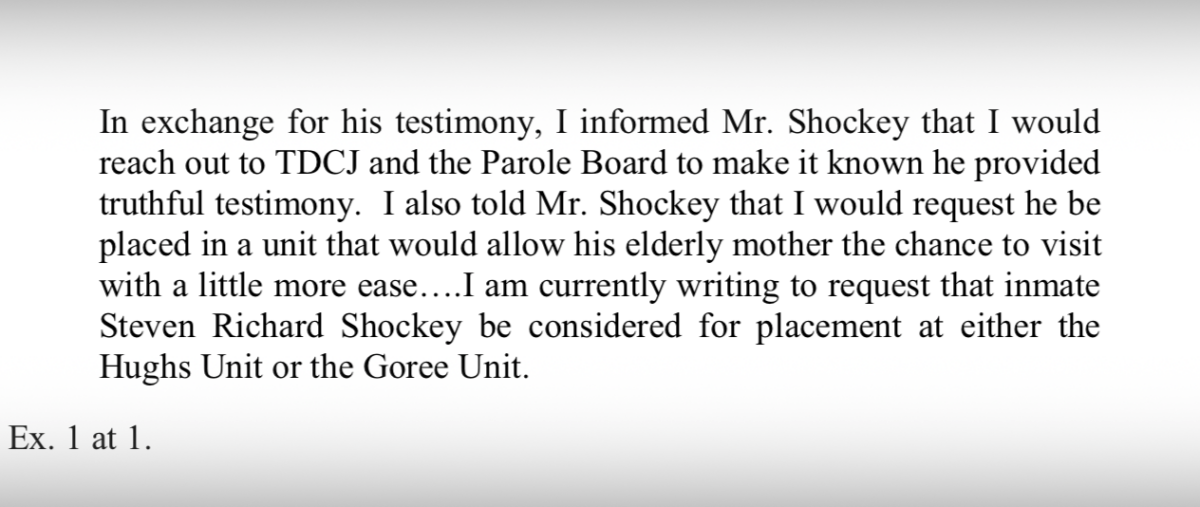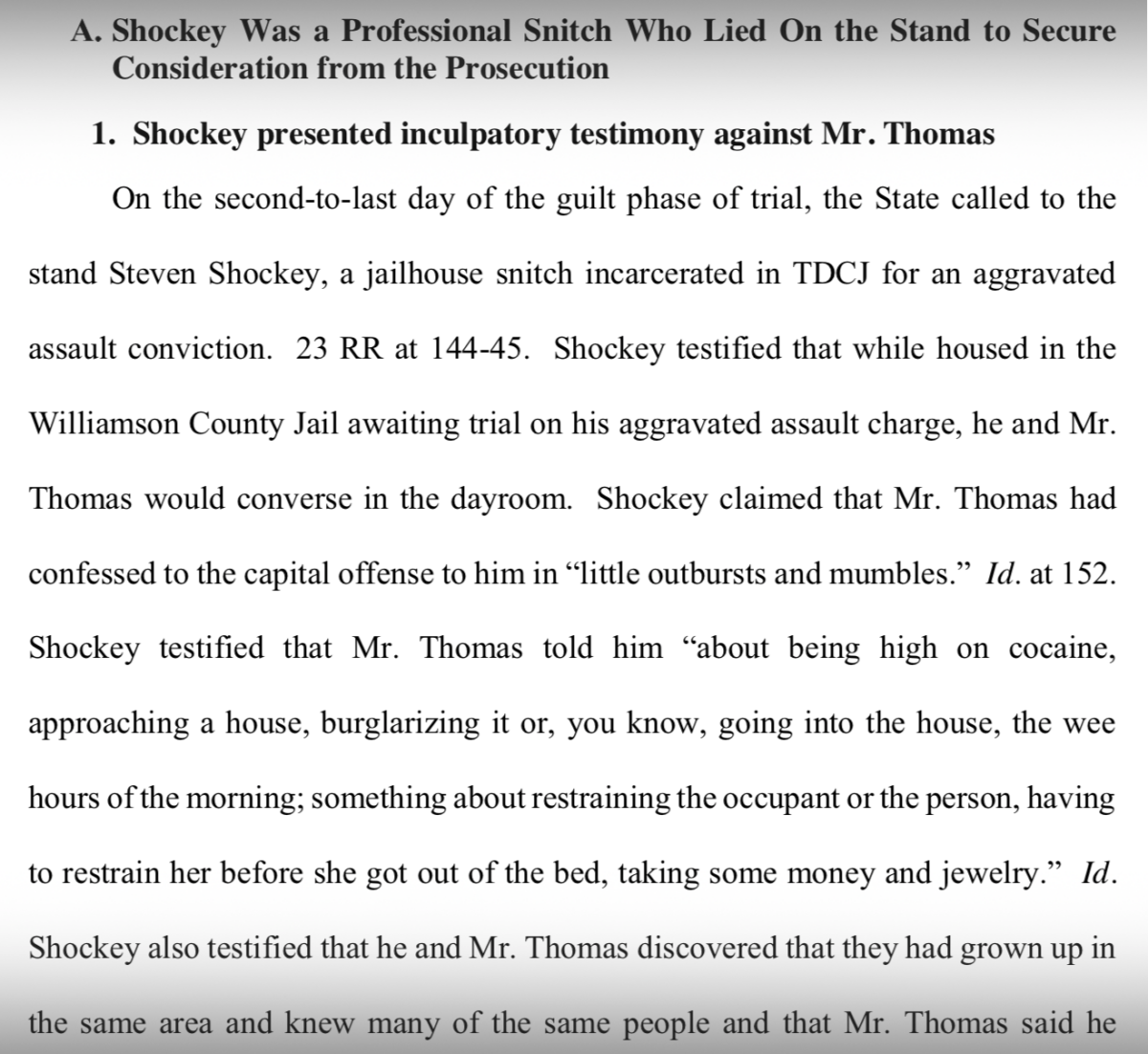Jailhouse Informant In High-Profile Texas Murder Cases Comes Under New Scrutiny
When Steven Shockey was arrested at a San Diego port of entry in December 2011, he knew his luck had run out. The 52-year-old was trying to re-enter the United States after jumping bail and fleeing to Mexico because of an arrest in Williamson County, Texas, for the aggravated assault of his ex-wife. Because of […]
When Steven Shockey was arrested at a San Diego port of entry in December 2011, he knew his luck had run out. The 52-year-old was trying to re-enter the United States after jumping bail and fleeing to Mexico because of an arrest in Williamson County, Texas, for the aggravated assault of his ex-wife.
Because of his long criminal record — which included state and federal arrests and convictions in both Texas and California — Shockey was eligible for Texas’s “habitual offender enhancement,” which could have landed him a maximum sentence of life or 99 years in prison instead of a maximum of 20 years for the second-degree felony.
Shockey’s late 2011 arrest at the border sent him right back to the Williamson County Jail. And then, like many other defendants facing lengthy sentences, Shockey decided to become a jailhouse informant.
As luck would have it, Shockey was in an ideal jail to do so.
When Shockey was incarcerated in the Williamson County Jail between January 2012 and August 2013, not one but two defendants in separate, high-profile murder cases were housed there. One defendant, Mark Norwood, had been arrested in November 2011 for the 1986 murder of Christine Morton after Morton’s husband, Michael, was exonerated in the case. Morton spent nearly 25 years behind bars for his wife’s murder. In 2013, the lead prosecutor in the case, Ken Anderson, pleaded no contest to charges of criminal contempt of court for withholding evidence that could have exonerated Morton. It was a notorious wrongful conviction case and it led to the brief imprisonment of Anderson, one of the few times in modern American history that a prosecutor was jailed for misconduct. The Morton case also spurred far-reaching state reforms of prosecutors’ handling of evidence.
The other high-profile defendant at the Williamson County Jail was also held for a decades-old murder. In July 2012, Steven Thomas was arrested for the 1980 murder of 73-year-old Mildred McKinney, after a marijuana possession arrest that year led to a DNA match of crime scene evidence.
So, in March 2012, Shockey contacted the Texas attorney general’s office from behind bars and claimed to have information about the Morton murder. In a March 29 interview with a lieutenant from the Williamson County sheriff’s office and an AG investigator, Shockey said that Norwood confessed to Morton’s murder during a conversation with him in the jail. Shockey claimed Norwood told him that he “went looking for money in that house and killed that bitch,” and that he’d lost his “lucky red bandana,” a reference to a bloodstained bandana found at the crime scene.
That the bandana was actually blue was apparently no matter to prosecutors, who, according to post-conviction pleadings, cut a deal with Shockey to cooperate in the Morton case. The state never even had him testify against the accused killer, Norwood. As part of Shockey’s plea agreement, prosecutors declined to apply the “habitual offender enhancement” to him and on May 16, 2013, Shockey pleaded guilty to aggravated assault with a deadly weapon and was given a 15-year sentence. He is currently eligible for parole beginning in April 2019. (When Norwood went to trial in the Morton murder in March 2013, he was convicted and sentenced to life in prison. The Texas Court of Criminal Appeals declined to review the Norwood case in 2015.)
But before the Norwood trial began in March 2013, an impatient-sounding Shockey told his sister on a jailhouse phone call that he was “working every angle I can to get out there and help” care for their ailing parents. In February 2013, Shockey contacted Lytza Rojas, an assistant district attorney with the Williamson County district attorney’s office. Shockey told Rojas that another alleged murderer — Steven Thomas — had confided in him at the Williamson County Jail.

“Think about how unlikely it is that the two most high-profile murder suspects in the Williamson County jail confessed for the first and only time to the same person,” Ashley Steele, one of Thomas’s post-conviction attorneys at the Office of Capital and Forensic Writs, an Austin-based public defender office that represents individuals in state post-conviction litigation, told The Appeal. “It just can’t be true.”
Shockey’s offer of information in the Thomas case, though, may have been particularly compelling to prosecutors because of the nature of the evidence against Thomas. DNA that allegedly tied Thomas to the crime scene only proved that Thomas couldn’t be excluded from a mixture of DNA found on medical tape on the victim’s thumb. At the time of the murder, according to his post-conviction attorneys, Thomas was employed as a pest control technician for a company that had the victim as a customer. In addition, according to post-conviction pleadings, Thomas’s DNA was not found in other DNA samples found in multiple places on the victim’s body.

When Shockey told Rojas that he had evidence against Thomas, Thomas’s post-conviction attorneys said, Rojas listened. On the day before the state rested its case in Thomas’s October 2014 trial, Shockey testified that Thomas confessed to him about the McKinney murder when they were incarcerated at the Williamson County Jail. Shockey told the jury that Thomas made inculpatory statements about the case in “little outbursts and mumbles,” describing a drug-addled robbery and murder scene. Under direct examination from Rojas, Shockey also told the jury that he hadn’t entered into any kind of deal with prosecutors.
“Do you recall … that I couldn’t promise you and would not promise you anything in exchange for the testimony and the things that you told John Foster [a Williamson County Sheriff’s Office detective] you heard?” Rojas asked.
“Correct,” Shockey replied.
Thomas was convicted three days later, and then sentenced to death on Nov. 18, 2014. Three months later, Shockey was transferred to a unit less than two hours away from his family.
When Thomas’s court-appointed attorneys began working on his appeal that November, they discovered a letter from Rojas to the Texas Department of Criminal Justice Correctional Institutions Division, charged with overseeing state prisons, stating, “In exchange for his testimony, I informed Mr. Shockey that I would reach out to TDCJ and the Parole Board to make it known he provided truthful testimony. I also told Mr. Shockey that I would request he be placed in a unit that would allow his elderly mother the chance to visit with a little more ease.”

Under Brady v. Maryland, the state must disclose such promises, rewards, or inducements given to government witnesses, and a failure to do so represents a violation of a defendant’s constitutional rights. And under Napue v. Illinois, the government cannot knowingly elicit false or misleading testimony from witnesses during a trial.
Thomas’s post-conviction lawyers believe that the state’s failure to disclose its deal with Shockey, as well as its elicitation of false testimony from him, should earn Thomas a new trial.
In their February 2018 response to Thomas’ petition, the state does not assert that it informed the defense counsel about the scope of the deals before or during trial. And in a sworn affidavit, one of Thomas’s trial attorneys said that, “I have no recollection of the fact that the prosecutor had agreed to send a letter recommending that Mr. Shockey be incarcerated near his mother’s residence. Nor do I recall being informed that Mr. Shockey had been an informant in another capital murder case during the course of our representation of Mr. Thomas.”
In contesting the allegation that it failed to disclose its deal with Shockey, however, the state claims that Shockey’s trial attorneys still haven’t proven that it didn’t know about the extent of the arrangements.
“The inability to remember being told does not affirmatively establish that they were not told,” Williamson County ADA John C. Prezas wrote in a response to Thomas’ Habeas petition. “Instead, Applicant has merely demonstrated that his counsel cannot recall whether or not the very fact upon which he bases this claim ever occurred.”
Shawn Dick, the current district attorney of Williamson County, declined to comment to The Appeal about the case because it is still ongoing. Dick took office in 2016, and since his election, the prosecutor’s office has seen a large amount of turnover.
In cases that go unresolved for decades, the prosecution often can’t rely on witnesses, Jennifer Laurin, a professor at the University of Texas School of Law, explained to The Appeal, because witnesses either can’t be located or can’t recall specific details with certainty — so prosecutors often bring an informant in to grease the wheels in the case.
But while there is a growing awareness in Texas and nationally about the dangers of using jailhouse informants, juries are still not sufficiently skeptical of them and, perhaps as a result, prosecutors continue to rely on their testimony to prop up their cases.
“One of the challenges of jailhouse informants is how entrepreneurial they can be,” University of California, Irvine law professor Alexandra Natapoff, whose 2009 book, Snitching: Criminal Informants and the Erosion of American Justice, explored the use of informants in the criminal justice system, told The Appeal. “What we have seen, is that they often come forward, or are invited to come forward, precisely when the other evidence in the case might not support conviction.”
Compounding the problems with prosecutors’ use of jailhouse informants is the fact that, according to Natapoff, “jurors are not that good at sorting out the significance of informant incentives. You see over and over again, jurors both in actual trials and also in research experiments are told that a witness is compensated and yet, they take that witnesses’ word anyway.”
On March 15, a District Court judge in Texas issued an order in response to Thomas’s Habeas petition, saying that several issues merit further investigation — whether Shockey testified in exchange for placement near his mother, whether prosecutors had made clear his involvement in the Norwood case, and whether his testimony at the Thomas trial was false and, if it was, whether that was material to the finding of guilt. The court will then hold a hearing on these issues and, if the court were to then find that any of these impacted the jury’s verdict, it’s possible that Thomas will be given a new trial.
According to a list compiled by the Death Penalty Information Center, of 15 defendants executed since 1976 despite their possible innocence, nine of them were in Texas. Carlotta Lepingwell, another attorney working on Thomas’s appeal, believes that given the new information they received about Shockey and his deals with the state, a new hearing is more than justified. “The people of Texas deserve to hear from ADA Rojas and Steve Shockey about this on the record, and have that tested in court.”
